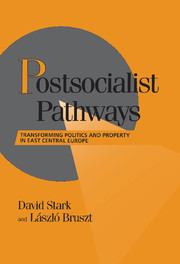Chapter 3 - Path Dependence and Privatization Strategies
from Part II - Transformation
Summary
CAPITALISM BY DESIGN?
Across the ruins of communism, a clear breeze blows from the West. Like the “fresh winds” that had been hailed from the East across the ruins of war more than four decades earlier, it promises prosperity through sacrifice. And like the old vision with its road maps to the promised land, this new vision comes with packaged formulas for applying economic science to the grand project of institutional reconstruction. In the postsocialist 1990s no less than in postwar 1948, devastation is seen as mandating boldness of action but also as presenting an opportunity: The collapse of the old order sets the imperative for ambitious experiments but also offers the occasion to build anew, this time with a fresh start to create capitalism by design.
As the juxtaposition of postwar Bolshevism and post—Cold War designer capitalism suggests, we are highly skeptical about analyses that approach the economic transition in East Central Europe as a problem to be solved by the rational design of economic institutions. Three sets of reasons inform this skepticism.
First, proposals for all-encompassing institutional change according to comprehensive blueprints suffer from an inadequate comparison of socialist and capitalist economic systems. Misled by the obviously superior efficiency and performance of capitalist institutions, the makers of such proposals mistakenly draw the conclusion that these institutions can be replicated according to instructions, whereas the deeper and more pertinent comparative lesson is that the failure of socialism rested precisely in the attempt to organize all economic processes according to a grand design. The notion that the more rational institutions can be implemented by conscious design thus duplicates the rationalist fallacy evidenced during the introduction of socialism with, for example, the Leninist notion that property relations could be changed overnight by administrative decree. Moreover, the premise that efficient institutions can be drafted at the systemic level ignores, as Peter Murrell acutely observes, the actual operations of existing capitalisms. The origins of capitalism in the West were not by blueprint, its development has not been directed by conscious design, and, as recent research in evolutionary economics and organizational ecology has demonstrated, its processes for selecting technologies and organizational forms are governed more by routine than by rational choice.
- Type
- Chapter
- Information
- Postsocialist Pathways , pp. 80 - 106Publisher: Cambridge University PressPrint publication year: 1998

